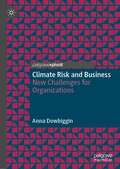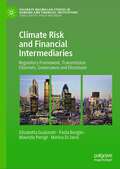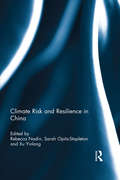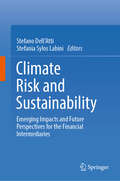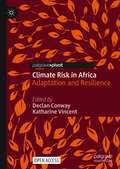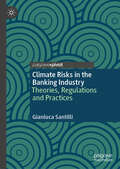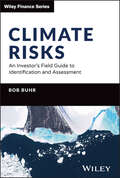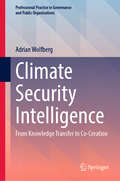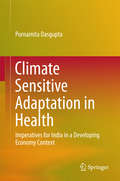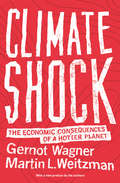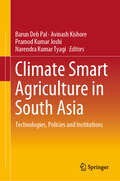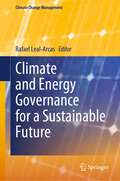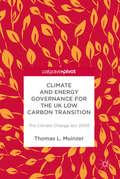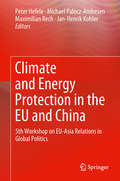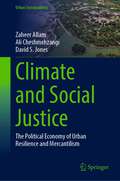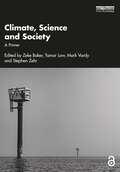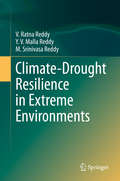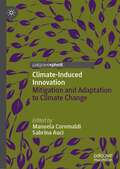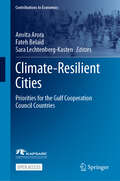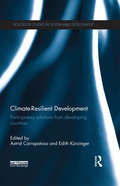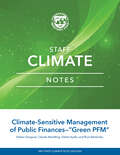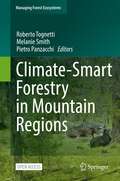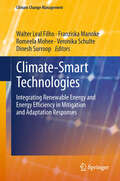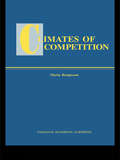- Table View
- List View
Climate Risk and Business: New Challenges for Organizations
by Anna DowbigginAddressing the urgency of radical decarbonization as a mitigative response to climate risk, this book explores how business can respond to the challenges of climate risk, through various transformational processes. Those processes involve cognitive transformations, organizational changes, climate risk integration into risk management practices, shifts in corporate reporting and disclosure as well as futuristic scenario-based planning beyond normal business planning cycles. Though much has already been written on corporate sustainability efforts, there is a greater need now for building mitigative capacity at the firm level, in alignment with shifting policy and regulatory regimes. Theoretical and empirical work on these areas is addressed in the novel thought experiment approach of this book. A research agenda for future work is provided.
Climate Risk and Financial Intermediaries: Regulatory Framework, Transmission Channels, Governance and Disclosure (Palgrave Macmillan Studies in Banking and Financial Institutions)
by Elisabetta Gualandri Paola Bongini Maurizio Pierigè Marina Di JanniClimate change is defining structural modifications that affect the economy and the financial system. Within Europe, supervisors and supervised entities are increasingly focusing on the consequences of environmental, social and governance (ESG) risks, as they impact the soundness and stability of the financial system or interfere with the transmission channels of monetary policy and price stability, as well as raising sustainability financing issues.Focusing on climate-related risks within the broader theme of the ESG risks, this book, structured in six chapters, analyzes the evolving overall regulatory framework, the climate risk transmission channels, the peculiarities of climate risk transmission channels with reference to specific business models of financial intermediaries, and the governance and disclosure implications of climate risks. It will be of interest to academics, practitioners, and students in the fields of banking, financial services, sustainability, ESG, andclimate risk.
Climate Risk and Resilience in China
by Rebecca Nadin Sarah Opitz-Stapleton Xu YinlongChina has been subject to floods, droughts and heat waves for millennia; these hazards are not new. What is new is how rapidly climate risks are changing for different groups of people and sectors. This is due to the unprecedented rates of socio-economic development, migration, land-use change, pollution and urbanisation, all occurring alongside increasingly more intense and frequent weather hazards and shifting seasons. China’s leadership is facing a significant challenge – from conducting and integrating biophysical and social vulnerability and risk assessments and connecting the information from these to policy priorities and time frames, to developing and implementing policies and actions at a variety of scales. It is within this challenging context that China’s policy makers, businesses and citizens must manage climate risk and build resilience. This book provides a detailed study of how China has been working to understand and respond to climatic risk, such as droughts and desertification in the grasslands of Inner Mongolia to deadly typhoons in the mega-cities of the Pearl River Delta. Using research and data from a wide range of Chinese sources and the Adapting to Climate Change in China (ACCC) project, a research-to-policy project, this book provides a fascinating glimpse into how China is developing policies and approaches to manage the risks and opportunities presented by climate change. This book will be of interest to those studying global and Chinese climate change policy, regional food, water and climate risk, and to policy advisors.
Climate Risk and Sustainability: Emerging Impacts and Future Perspectives for the Financial Intermediaries
by Stefano Dell’Atti Stefania Sylos LabiniThis book analyzes recent trends and upcoming challenges in corporate governance and risk management in financial institutions with a particular focus on their rule in promoting a sustainable economic growth model. The impact of negative events caused by environmental and climate change can have significant consequences for the real economy and the financial system. This relevant impact has been affirmed several times by financial regulators and supervisors and has led to set objectives and encourage practices in line with Environmental, Social and Governance (ESG) issues in order to push both financial and nonfinancial firms towards a sustainable and circular economic model. The issue of climate risk change related to finance has launched a wide political debate at international and European level and was deepened investigated in literature. The analysis will be conducted at an international level, with a particular focus on Europe. The interdisciplinary will allow to address multiple issues under three, in our opinion, indispensable different profiles: i) managerial ii) mathematical (quantitative) and iii) legal. In this direction, the research aims to develop new knowledge and skills through the integration and cooperation between the different sectors and disciplines. In the scope of Marie Sklodowska-Curie Actions, the research would deepen the role of finance in accelerating the green transition towards a circular, climate-neutral and sustainable economy.
Climate Risk in Africa: Adaptation and Resilience
by Declan Conway Katharine VincentThis open access book highlights the complexities around making adaptation decisions and building resilience in the face of climate risk. It is based on experiences in sub-Saharan Africa through the Future Climate For Africa (FCFA) applied research programme. It begins by dealing with underlying principles and structures designed to facilitate effective engagement about climate risk, including the robustness of information and the construction of knowledge through co-production. Chapters then move on to explore examples of using climate information to inform adaptation and resilience through early warning, river basin development, urban planning and rural livelihoods based in a variety of contexts. These insights inform new ways to promote action in policy and praxis through the blending of knowledge from multiple disciplines, including climate science that provides understanding of future climate risk and the social science of response through adaptation.The book will be of interest to advanced undergraduate students and postgraduate students, researchers, policy makers and practitioners in geography, environment, international development and related disciplines.
Climate Risks in the Banking Industry: Theories, Regulations and Practices
by Gianluca SantilliAs climate change intensifies globally, it also poses unprecedented challenges to the banking sector that require attention. This book examines how climate risks are reshaping the banking industry. Unlike the existing literature, which is mostly practitioner-oriented, this manuscript provides readers with a detailed and research-based analysis of both physical and transition risks, bridging the gap between climate science and banking theory from a global perspective. Climate Risks in the Banking Industry seeks to examine the development of these issues through different lenses by asking some important theoretical and practical questions. Is it possible to establish an academic framework for the transmission of climate risks through banking systems, and what empirical evidence supports these theoretical models? What regulatory approaches are being developed globally to address climate-related financial risks, and how do these differ across jurisdictions? How are financial institutions implementing climate risk management frameworks in practice, and what are the challenges in translating theoretical models into operational tools? In line with the above objectives, this volume provides a framework that maps the existing academic research on climate risks in banking and offers a basis for future studies and practical applications. It includes an in-depth comparative analysis of international regulatory responses to provide a truly global vision. The book also examines how physical and transition risks affect different banking businesses and products, assesses current risk methodologies and their limitations, and proposes innovative approaches for integrating climate considerations into existing risk management frameworks. It can serve as an important resource for academics in banking, finance and environmental studies, while also providing valuable implications for policymakers, regulators and advanced students.
Climate Risks: An Investor's Field Guide to Identification and Assessment (The Wiley Finance Series)
by Bob BuhrAssess the likelihood, timing and scope of climate risks In Climate Risks: An Investor’s Field Guide to Identification and Assessment, financial analyst Bob Buhr delivers a risk-based framework for classifying and measuring potential climate risks at the firm level, and their potential financial impacts. The author presents a “climate risk taxonomy” that encompasses a broad range of physical, transition and natural capital risks that may impact a firm’s financial profile. The taxonomy presented in the book will be of interest to investors and lenders involved in: The identification and assessment of the potential scope and impact of a wide range of risks that might normally remain outside of more traditional risk or credit analysis, usually for horizon issues; The determination of the points at which climate risks may crystallize into real and significant financial exposure The assessment of the relative aggregate riskiness of portfolios exposed to climate and natural capital risks at the firm levelA rigorous and practical toolkit for the assessment and measurement of a broad range of potential climate risks, this book offers fund managers, portfolio analysts, risk experts, and other finance professionals a clear blueprint for assessing potential financial impacts at firms arising from climate change.
Climate Security Intelligence: From Knowledge Transfer to Co-Creation (Professional Practice in Governance and Public Organizations)
by Adrian WolfbergClimate security intelligence is the capacity to warn national and sub-national security organizations of the physical effects of climate change that can have a negative societal effect on nations, governments, and their populations. This book discusses the uniqueness of climate security intelligence, the maturity of its development as a knowledge domain, and its possible future. Written by an intelligence analyst with over forty years of experience, this book centers upon the challenges that organizations may face when analysts, their managers, and their organizations are given the task of warning policymakers and decision-makers about threats to climate security. Taking a necessarily transdisciplinary approach, this book will be of interest to a wide audience of students, researchers, practitioners, and policy-makers concerned with how the impacts of climate change affect the social, cultural, political, and economic stability of national interests.
Climate Sensitive Adaptation in Health: Imperatives for India in a Developing Economy Context
by Purnamita DasguptaThis book focuses on the risks that climate change poses for the health sector. It discusses the current vulnerabilities to climate-sensitive diseases, the resultant mortality and morbidity in human populations, the projected risks in connection with increasing global warming, and the options for tackling the adverse impacts of climate change. Adapting to climate change so as to effectively address the risks for and adverse impacts on the health sector requires an in-depth understanding of current deficits in health sector preparedness for climate-sensitive illnesses, as well as future plans and programs for increasing adaptive capacity and building resilience. The book situates climate and health adaptation concerns in the broader context of developing countries, providing insights that can be useful for other countries as well, helping them further their health adaptation efforts. In India, poverty and inadequate access to basic water, health and sanitation services combine with climate-related events to adversely impact health outcomes. Three case studies on the occurrence of heat stress, flooding, and extreme cyclonic events in India are presented along with a critical assessment of the level of preparedness and capacity of healthcare facilities to respond to the threats posed by climate change. The book presents the key challenges faced in reducing the risks posed to the health sector by climatic factors, and highlights the most important opportunities for promoting resilience and adaptation to achieve sustainable development. Dr. Dasgupta's excellent book reviews the health risks of climate change, outlines an operational framework for health adaptation, and describes the socioeconomic context for adaptation in India. - Kristie L. Ebi Professor, Departments of Global Health, and Environmental and Occupational Health Sciences, University of Washington, USA This pioneering work contributes to an the understanding of the preparedness in India to manage health risks from such change on the basis of detailed data analysis, both from large national surveys and contextualized field based surveys. - Kanchan Chopra Former Director and Professor, Institute of Economic Growth, New Delhi, India
Climate Shock
by Gernot Wagner Martin L. WeitzmanIf you had a 10 percent chance of having a fatal car accident, you'd take necessary precautions. If your finances had a 10 percent chance of suffering a severe loss, you'd reevaluate your assets. So if we know the world is warming and there's a 10 percent chance this might eventually lead to a catastrophe beyond anything we could imagine, why aren't we doing more about climate change right now? We insure our lives against an uncertain future--why not our planet?In Climate Shock, Gernot Wagner and Martin Weitzman explore in lively, clear terms the likely repercussions of a hotter planet, drawing on and expanding from work previously unavailable to general audiences. They show that the longer we wait to act, the more likely an extreme event will happen. A city might go underwater. A rogue nation might shoot particles into the Earth's atmosphere, geoengineering cooler temperatures. Zeroing in on the unknown extreme risks that may yet dwarf all else, the authors look at how economic forces that make sensible climate policies difficult to enact, make radical would-be fixes like geoengineering all the more probable. What we know about climate change is alarming enough. What we don't know about the extreme risks could be far more dangerous. Wagner and Weitzman help readers understand that we need to think about climate change in the same way that we think about insurance--as a risk management problem, only here on a global scale.Demonstrating that climate change can and should be dealt with--and what could happen if we don't do so--Climate Shock tackles the defining environmental and public policy issue of our time.
Climate Smart Agriculture in South Asia: Technologies, Policies and Institutions
by Barun Deb Pal Avinash Kishore Pramod Kumar Joshi Narendra Kumar TyagiThis book discusses various climate smart agro-technologies, their technical and economic feasibility across heterogeneous agro-climatic conditions, assessing farmers’ willingness to adopt those technologies, impact of climate smart technology in agricultural production and possible policy and investment opportunities to upscale it. Containing eight chapters, the book starts with a discussion about the methodological aspects of priority setting of the farm technologies across various regions of South Asia including Eastern Indo-Gangetic plain, Western Indo-Gangetic Plain and arid regions. Using data from field based trials and expert solicitations, the book next deliberates on a list of feasible technologies, assessed by constructing climate smart Feasibility Index. Further on, there is an analysis, using stated preference method, of the behaviour of farmers in adopting climate smart technologies. Preference of women farmers has been given a special focus in this book. After discussing the method priority setting of the farm technologies, impact of climate smart technologies has been analysed using real time data. Government policies have been reviewed with the view of achieving climate smart agriculture in South Asia. The book also describes the optimization modelling framework for investment allocation and technology prioritization. The model integrates both the bio-physical and the economic optimization model to capture the agro-climatic heterogeneity within the region and the variability of technical feasibility across regions and crops. Results of this model will help policy makers to identify how much to invest, where to invest and what technologies to prioritize for investments.
Climate and Energy Governance for a Sustainable Future (Climate Change Management)
by Rafael Leal-ArcasThis book includes contributions by leading experts across the globe with the first part of the book focusing on the analysis of the Paris Agreement on Climate Change, examines COP26, and questions the political process in the US for the creation of policy for meaningful greenhouse gas emissions reductions. Part 2 explores various ways in which one can effectively mitigate climate change. The contents provide an analysis of carbon pricing, development of specific green energy technologies to promote economic prosperity, and analysis of electric vehicles and other elements of electrification in areas with carbon-intensive electricity supply. Part 3 analyses the international dimension of energy governance (both regional and global) and climate action. It further provides an analysis of the challenges faced by small island developing states, least-developed countries and other vulnerable places. It also offers an analysis of the prospects for a European Energy Union and explores why energy security and decarbonization are significant. Lastly, it explores global energy governance and how its fragmentation can be reduced. This volume will be a useful reference for those in industry and academia.
Climate and Energy Governance for the UK Low Carbon Transition: The Climate Change Act 2008
by Thomas L MuinzerThe UK Climate Change Act was the first case of a country implementing blanket legally binding long-term emissions reduction targets in order to combat climate change. This book provides the first accessible and in-depth analysis of the UK’s complex Climate Change Act framework, presenting the discussion in a clear and interdisciplinary manner designed to open the workings of the challenging framework to a broad audience. It discusses the political ‘story’ surrounding the framework, and its treatment in scholarly environmental literature; analyses the technical content of the Act; explores the framework’s international significance, and its internal ‘subnational’ dimensions and impact, engaging the UK’s devolved jurisdictions of Northern Ireland, Scotland, and Wales. This first, much-needed interdisciplinary treatment of the framework is both introductory and analytical in nature and will be of interest to scholars, practitioners and general readers of environmental studies, policy and governance.
Climate and Energy Protection in the EU and China: 5th Workshop On Eu-asia Relations In Global Politics
by Michael Palocz-Andresen Peter Hefele Maximilian Rech Jan-Henrik KohlerThis edited volume gives an insight into climate and energy protection in China and the European Union (EU). By taking a closer look at the EU and China seperately, the book presents the current situation in terms of environmental policy and energy use/ consumption in EU as well as in China. The book broaches the collaboration of the EU and China regarding climate and energy protection. The target audience primarily comprises research experts in the field of climate research as well as public decision makers.
Climate and Social Justice: The Political Economy of Urban Resilience and Mercantilism (Urban Sustainability)
by Ali Cheshmehzangi David S. Jones Zaheer AllamThis book offers a fresh perspective on the historical, economic, and cultural foundations of capitalism, cities, and climate change. By exploring the intersection of urbanization, consumerism, and colonialism, the book sheds new light on the origins and development of the economic system that has shaped our world today. What sets this book apart is its unique approach, which challenges conventional wisdom and offers new insights into the complex relationships between culture, politics, and economics. The book is intended for readers interested in the history and evolution of capitalism and its impact on society, as well as those interested in climate change and urbanization. The content level is accessible for general readers, yet sophisticated enough to appeal to scholars and researchers. The two most important features of the book are its fresh perspective on the history of mercantilism and its examination of the economic landscape of cities and climate change. By reading this book, readers gain a deeper understanding of the complex relationships between urbanization, colonialism, and economic policies, and their impact on contemporary society.
Climate, Science and Society: A Primer
by Zeke Baker Tamar Law Mark Vardy Stephen ZehrClimate, Science and Society: A Primer makes cutting-edge research on climate change accessible to student readers. The primer consists of 37 short chapters organized within 11 parts written by Science and Technology Studies (STS) and other social science scholars. It covers a range of key topics including communication, justice and inequality, climate policy, and energy transitions, situating each one within the context of STS studies. Each reading translates a focused area of climate change research into short, accessible, and lively prose. Chapter authors open debates where relevant, consider policy implications, critique existing areas of research, and otherwise situate their reading within a larger body of research relevant to climate change courses. Designed as a jumping-off point for further exploration, this innovative book will be essential reading for students studying climate change, STS, environmental sociology, and environmental sciences. The Open Access version of this book, available at www.taylorfrancis.com, has been made available under a Creative Commons Attribution-Non Commercial-No Derivatives 4.0 license.
Climate-Drought Resilience in Extreme Environments
by V. Ratna Reddy Y. V. Reddy M. Srinivasa ReddyThis book assesses the effectiveness of changes in watershed interventions in one of the most fragile resource regions of India. Specifically the chapters examine various watershed centred interventions and their implementation process. An evaluation of the livelihood impacts, including crop production on the communities, is discussed and an assessment of the drought and climate resilience of households in the context of watershed and related interventions, including institutions and capacity of the communities, is investigated. Lessons are drawn to further identify measures to strengthen and improvise interventions for enhanced climate-drought resilience in harsh environments.
Climate-Induced Innovation: Mitigation and Adaptation to Climate Change
by Manuela Coromaldi Sabrina AuciThis book investigates the role of climate-induced innovation and climate change mitigation technologies in reducing the negative impact of climate change. Through original case studies and analysis, frameworks to both reduce the emission of greenhouse gases and respond to the impacts of a changing climate are explored. Particular attention is given to biotechnology patents and innovations for small farm agriculture. This book aims to provide new insight into the relationship between climate change and innovation, highlighting the problems and opportunities posed by the transition to an environmentally sustainable society. It will be relevant to students and researchers interested in environmental and innovation economics.
Climate-Resilient Cities: Priorities for the Gulf Cooperation Council Countries (Contributions to Economics)
by Fateh Belaïd Anvita Arora Sara Lechtenberg-KastenThis edited volume discusses the concept of resilient cities within the Gulf Cooperation Council (GCC) region. Written by an international panel of scholars and experts, the book presents theoretical approaches, identifies risk factors, and suggests policies for building resiliency in a region of the world undergoing rapid urbanization. Chapters cover a diverse range of topics, including innovative concepts and studies in resilient city design, the interaction of social, entrepreneurial, governmental, and ecological transformations in the GCC region, and international best practices for risk reduction. Coupling rigorous economic analysis and practical policy implications, this book will be useful for students and academics of finance, governance, energy and resource economics, and climate change, as well as policymakers, community leaders, and risk reduction professionals.This is an open access book.
Climate-Resilient Development: Participatory solutions from developing countries (Routledge Studies in Sustainable Development)
by Astrid Carrapatoso Edith KürzingerThe concept of resilience currently infuses policy debates and public discourse, and is promoted as a normative concept in climate policy making by governments, non-governmental organizations, and think-tanks. This book critically discusses climate-resilient development in the context of current deficiencies of multilateral climate management strategies and processes. It analyses innovative climate policy options at national, (inter-)regional, and local levels from a mainly Southern perspective, thus contributing to the topical debate on alternative climate governance and resilient development models. Case studies from Africa, Asia, and Latin America give a ground-level view of how ideas from resilience could be used to inform and guide more radical development and particularly how these ideas might help to rethink the notion of 'progress' in the light of environmental, social, economic, and cultural changes at multiple scales, from local to global. It integrates theory and practice with the aim of providing practical solutions to improve, complement, or, where necessary, reasonably bypass the UNFCCC process through a bottom-up approach which can effectively tap unused climate-resilient development potentials at the local, national, and regional levels. This innovative book gives students and researchers in environmental and development studies as well as policy makers and practitioners a valuable analysis of climate change mitigation and adaptation options in the absence of effective multilateral provisions.
Climate-Sensitive Management of Public Finances—"Green PFM"
by International Monetary FundA report from the International Monetary Fund.
Climate-Smart Forestry in Mountain Regions (Managing Forest Ecosystems #40)
by Melanie Smith Roberto Tognetti Pietro PanzacchiThis open access book offers a cross-sectoral reference for both managers and scientists interested in climate-smart forestry, focusing on mountain regions. It provides a comprehensive analysis on forest issues, facilitating the implementation of climate objectives. This book includes structured summaries of each chapter.Funded by the EU’s Horizon 2020 programme, CLIMO has brought together scientists and experts in continental and regional focus assessments through a cross-sectoral approach, facilitating the implementation of climate objectives. CLIMO has provided scientific analysis on issues including criteria and indicators, growth dynamics, management prescriptions, long-term perspectives, monitoring technologies, economic impacts, and governance tools.
Climate-Smart Technologies: Integrating Renewable Energy and Energy Efficiency in Mitigation and Adaptation Responses (Climate Change Management)
by Walter Leal Filho Romeela Mohee Dinesh Surroop Franziska Mannke Veronika SchulteThe book addresses the perceived need for a publication with looks at both, climate smart technologies and the integration of renewable energy and energy efficiency in mitigation and adaptation responses. Based on a set of papers submitted as part of the fifth on-line climate conference (CLIMATE 2012) and a major conference on renewable energy on island States held in Mauritius in 2012, the book provides a wealth of information on climate change strategies and the role of smart technologies. The book has been produced in the context of the project "Small Developing Island Renewable Energy Knowledge and Technology Transfer Network" (DIREKT), funded by the ACP Science and Technology Programme, an EU programme for cooperation between the European Union and the ACP region.
Climates of Global Competition (Routledge Studies in Global Competition #Vol. 5)
by Maria BengtssonClimates of Competition studies the innovations and manoeuvres of geographically proximate competitors to further understand the nature and dynamics of competition.Through case-studies of manufacturers competing for shares in three industrial markets - agricultural machinery, processing equipment and heavy lifting equipment - a detailed picture of the nature of competition emerges.By combining questions of geography with those of corporate strategy, this study provides an advanced analysis of the relationship between competition and corporate learning processes.
